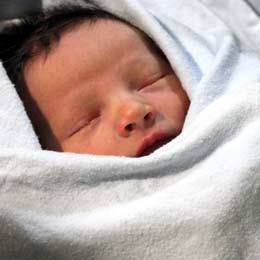HPV vaccine prevents infection with human papillomavirus (HPV) types that are associated with many cancers.
Why get your child vaccinated?
HPV vaccine prevents infection with HPV types that cause genital warts in both females and males. In the U.S., about 12,000 women get cervical cancer every year, and about 4,000 women die from it. HPV vaccine can prevent most of these cases of cervical cancer.
NOTE: Gardasil-9 (9-valent HPV vaccine) will soon be the only HPV vaccine available in the United States. The last doses of Cervarix expired at the end of November 2016, and the VIS has been removed.
The Gardasil (quadrivalent HPV vaccine) VIS will be taken down when the last doses have expired in May of 2017.
HPV vaccine prevents infection with human papillomavirus (HPV) types that are associated with many cancers, including:
- cervical cancer in females,
- vaginal and vulvar cancers in females,
- anal cancer in females and males,
- throat cancer in females and males, and penile cancer in males.
Who Should Get the HPV Vaccine?
- HPV vaccination is recommended for preteen girls and boys at age 11 or 12 years.
- All preteens need HPV vaccination so they can be protected from HPV infections that cause cancer.
- Teens and young adults who didn’t start or finish the HPV vaccine series also need HPV vaccination. Teens and young women can get HPV vaccine until they are 27 years old and young men should get HPV vaccine until they are 22 years old.
- Teens and young men who have sex with other men or who have weakened immune systems should get HPV vaccine until they are 27.
- Transgender individuals should also get HPV vaccine until they are 27.
The CDC recommends that 11- to 12-year-olds receive two doses of HPV vaccine at least six months apart to protect against cancers caused by human papillomavirus (HPV) infections.
- The first dose is routinely recommended at 11-12 years old.
- The second dose of the vaccine should be administered 6 to 12 months after the first dose.
- Vaccination with the two-dose series can be started at age 9 and through age 14.
Teens and young adults who start the series later, at ages 15 through 26 years, need three doses of HPV vaccine to protect against cancer-causing HPV infection.
Adolescents aged 9 through 14 years who have already received two doses of HPV vaccine less than 5 months apart, will require a third dose. Three doses are recommended for people with weakened immune systems aged 9-26 years.
Medications
Well-Child Checkups
Other Routine Immunizations We Provide
-
Diphtheria, Tetanus, and Pertussis (DTaP)
Diphtheria, tetanus, and pertussis are serious diseases caused by bacteria. Diphtheria and pertussis are spread from person to person. Tetanus enters the body through cuts or wounds.
-
Hepatitis A
Hepatitis A is a serious liver disease caused by the hepatitis A virus (HAV). HAV is spread from person to person through contact with the feces (stool) of people who are infected, which can easily happen if someone does not wash his or her hands properly.
-
Hepatitis B
Hepatitis B is a serious disease that affects the liver. It is caused by the hepatitis B virus. Hepatitis B can cause mild illness lasting a few weeks, or it can lead to a serious, lifelong illness.
-
Hib (Haemophilus Influenzae Type B)
Haemophilus influenzae type b (Hib) disease is a serious disease caused by bacteria. It usually affects children under 5 years old. It can also affect adults with certain medical conditions.
-
HPV
HPV vaccine prevents infection with human papillomavirus (HPV) types that are associated with many cancers.
-
Influenza - Inactivated
Influenza or “flu” is a contagious disease that spreads around the United States every year, usually between October and May.
-
Measles, Mumps, Rubella (MMR)
Measles, Mumps, Rubella, and Varicella (chickenpox) can be serious diseases. These diseases can spread from person to person through the air. Varicella can also be spread through contact with fluid from chickenpox blisters.
-
Measles, Mumps, Rubella & Varicella (MMRV)
Measles, Mumps, Rubella, and Varicella (chickenpox) can be serious diseases. These diseases can spread from person to person through the air. Varicella can also be spread through contact with fluid from chickenpox blisters.
-
Meningococcal Conjugate Vaccines (MCV)
Meningococcal disease is a serious illness caused by a type of bacteria called Neisseria meningitidis. It can lead to meningitis (infection of the lining of the brain and spinal cord) and infections of the blood.
-
Serogroup B Meningococcal (MenB)
Meningococcal disease is a serious illness caused by a type of bacteria called Neisseria meningitidis. It can lead to meningitis (infection of the lining of the brain and spinal cord) and infections of the blood.
-
Pneumococcal Conjugate (PCV13)
Pneumococcal disease is caused by bacteria that can spread from person to person through close contact. It can cause ear infections, and it can also lead to more serious infections .
-
Polio
Polio is a disease caused by a virus. It is spread mainly by person-to-person contact. It can also be spread by consuming food or drinks that are contaminated with the feces of an infected person.
-
Rotavirus
Rotavirus is a virus that causes diarrhea, mostly in babies and young children. The diarrhea can be severe, and lead to dehydration.
-
Tdap (Tetanus, Diphtheria, Pertussis)
Tetanus, diphtheria, and pertussis are very serious diseases. Tdap vaccine given to pregnant women can protect newborn babies against pertussis.
-
Varicella (Chickenpox)
Chickenpox (also called varicella) is a common childhood disease. It is usually mild, but it can be serious, especially in young infants and adults.
Immunization Schedules from the CDC
Easy-to-read formats to print, tools to download, and ways to prepare for your office visit.





















